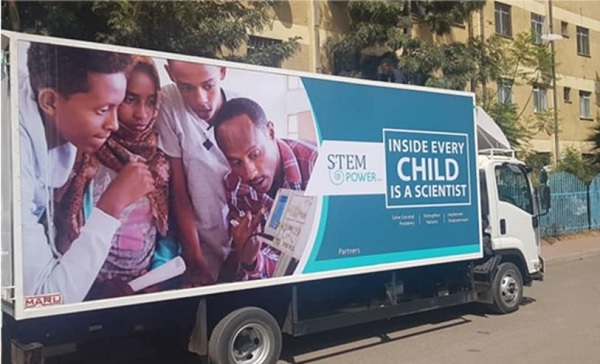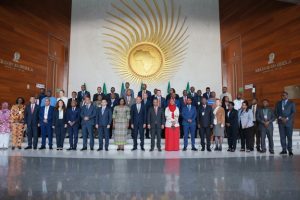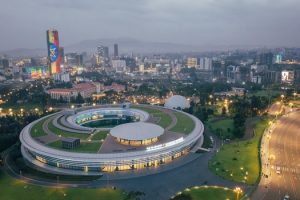
STEM power Ethiopia, operating in Ethiopia for the past 15 years, has been investing in developing practical education in the fields of Science, Technology, Engineering, and Maths (STEM). To promote practical education and cultivate youth talents, STEMpower, jointly with stakeholders, has established 65 STEM Centers across the country, where they currently serve thousands of students. In the current technologically dominated era, the education sector gives due attention to practical research, technological innovations, and the development of creativity by promoting and cultivating talent.
However, the education sector in the developing world is dominated by theory and lacks practical lab supported education. As a result, developing countries remain dependent on the technological results from the developed world. As the developing world understands the role of education in promoting innovation, technological development and creativity, STEM education gets new attention. STEMpower is contributing its share to developing this national effort in Ethiopia by expanding STEM Centers equipped with the necessary lab inputs.
Despite STEMpower has ability to establish 65 STEM Centers across Ethiopia, due to its expensive nature of establishing STEM Centers across all areas, there is a huge gap in finding lab centers equipped with the necessary inputs. As a solution, STEMpower Ethiopia launched a mobile lab. Approached by The Ethiopian Herald, STEMpower Ethiopia Country Director, Simenew Keskes (PhD) said that establishing STEM centers across the country is expensive. Therefore, as a solution, using mobile labs is an innovative approach that STEMpower has applied by bringing the lab directly to students in different areas.
The mobile truck lab, launched by STEMpower Ethiopia assembled within a refurbished truck, enables students across the country to access renewable lab kits and hands-on materials to practice what they have learned in theory in the classroom. It especially benefits those who do not have equal access to the materials, thereby integrating theoretical learning with practical trials.
Israel Gebru, Electromechanical Expert at the STEMpower mobile lab, said that the mobile lab is equipped with the necessary lab materials and inputs. It has science kit materials prepared to teach physics principles practically, prepared to promote a participatory teaching-learning process through engaging students.
As to him, the Ethiopian education system is dominated by theoretical education, despite recent developments in integrating practical education through labs and other mechanisms. To develop and support the theory-dominated education system through practical learning mechanisms and labs, labs play significant role where it helps students to participate and practice in lab testing.
“Lab helps students to understand the practical process, which is crucial to develop their knowledge and understanding,” Israel said, adding, “It is difficult to deeply understand science education through theory only.” Hence, to develop students’ comprehensive understanding of science education, it is critical to expand practical learning methods and labs. Promoting and developing practical science education will have a significant impact on the development of technological innovations and practical research.
Eyob Ayechew, also an Electronics Expert at STEMpower Ethiopia, supports students who come to the mobile STEM lab, which has been offering services for more than the last five years, accommodating hands-on educational materials in electronics, computer skills, industrial computing, and 3D printing. Eyob told The Ethiopian Herald that such an approach narrows the practical knowledge gap between students who have access to materials and those who do not. The number of students interested in using STEMpower’s lab has been increasing over time, requiring the organization to establish selection criteria for participation.
“The mobile lab initiative helps students experience digital life in STEM education,” Eyob said, adding the mobile lab serves 600 to 700 students per year, with 15 to 20 students at a time. The lab has improved STEMpower’s overall capability and coverage, enabling over 1,000 students to access hands-on materials each year, he said.
So far, the mobile lab has served students in various parts of the country, including Bishoftu and Wollo, where the organization’s lab experts have guided students from more than 20 schools. “One of our programs is a lab session. The national curriculum includes activities that students should practice, and our lab allows them to verify what they have learned in theory. This could be checking the practicality of a physics formula or making a chemical solution,” Eyob noted.
For Simenew Keskes (PhD), STEMpower Ethiopia Country Director, expanding mobile labs needs strong collaboration of all stakeholders, inviting organizations to step into the expansion of mobile labs. Semenew said that STEMpower could convert about 10 buses or trucks into mobile labs if the necessary vehicles were provided.
Despite the development of STEM Centers, which have currently reached 65 in Ethiopia, still, Semenew emphasized that in a country with a population of over 100 million, having only 65 STEM centers shows insufficiency. Hence, Semenew calls on stakeholders to collaborate in expanding mobile labs. “We deeply believe that STEM education is highly impactful—without it, we cannot achieve anything. STEM education is the foundation of innovation. In such a digitalized world, if we are not competent enough, we cannot move an inch,” Simenew stressed. According to Simenew, it remains difficult for STEMpower Ethiopia to reach.
The Director added that the organization faces financial and bureaucratic challenges, making it difficult to reach every corner of the country with its vital hands-on education. He urged the government and decision-makers to prioritize and invest in the expansion of STEM education, understanding its potential to improve citizens’ lives.
STEMpower plans to expand across Africa this year by establishing 20 more STEM centers. It has a vision of achieving technology-driven development in Ethiopia and other African countries through practical STEM education, aiming to cover every African country by 2025. Operating in about 35 African countries, the organization has provided access to practical science, technology, engineering, and mathematics (STEM) education to over two million Africans. However, for Semenew, given the continent’s large population, this number remains insufficient.
Therefore, the organization is striving to reach the remaining 20 countries and cover the entire continent this year. STEMpower Ethiopia establishes centers and oversees their functionality throughout the year. It strengthens existing centers and ensures that training continues year in and year out. Simenew explained that engineers from the Ethiopian office travel to each African country to install facilities and train STEM center professionals.
BY DARGIE KAHSAY
THE ETHIOPIAN HERALD FRIDAY 11 APRIL 2025




